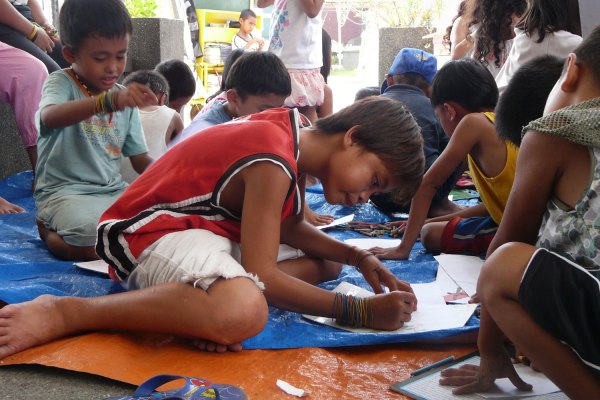
Brother Efren is easy to find. Trace the curve of Manila Bay south, past the skyscrapers, through the urban sprawl. Inch across a jammed highway flanked by fishing huts on flamingo stilts. From there, the locals will be happy to guide you. “You must be here to see Efren,” ventures a man at a stop sign. “Take a left.” Offers another, moments later: “Looking for Ef? You’re going the right way.”
The pride of Cavite City, the man its residents call Brother Ef, is Efren Peñaflorida. Now 32, Peñaflorida survived a childhood marked by poverty, bullying and beatings to become CNN’s 2009 Hero of the Year and one of the Philippines’ most admired activists. As a teenager, he saw a simple solution to an enduring problem: the country’s most vulnerable children—street kids, scavengers—lack the time and money to go to school. So he took school to them. He packed pushcarts, or kariton, with books, toothbrushes and Band-Aids and wheeled them into the slums. Kids came running.
Some 15 years later, he’s still at it. The organization he co-founded, Dynamic Teen Co., uses kariton classrooms to connect with street kids and help get them back to formal schooling. The model has been so successful that it has been adopted across the Philippines, as well as in Indonesia and Kenya. “The idea is very simple,” says Peñaflorida. “Take kids what they need.”
In the Philippines, that need runs deep. The recent economic boom has bolstered the country’s bottom line, but, as Supertyphoon Haiyan made brutally clear, vast swaths of the population remain poor and marginalized. In 2011 the National Statistics Office estimated that 3 million Filipinos ages 5 to 17 worked mostly in “hazardous” conditions. A U.S. Department of Labor report suggests that the number dropped in 2012, thanks in part to a government program that pays parents to keep kids in school. Still, in Manila and its overburdened suburbs, it is common to see stick-legged children picking through piles of garbage, their backs bent double like old men.
It’s a scene Peñaflorida knows well. Born and raised on the edge of Cavite’s city dump, he spent his childhood hauling ingredients for his mother’s fried-noodle stand while dodging neighborhood thugs. He remembers patching his shoes with plastic scraps and being bullied, violently, because of his threadbare clothes. By age 13, he says, he felt “alone, angry, completely hardened.”
Peñaflorida might have stayed that way if he hadn’t met the man who would become his mentor, Harnin Manalaysay, then a professor who spent his weekends doing community outreach. Manalaysay saw Peñaflorida lingering hesitantly at the side of a basketball match and took him under his wing. The young man was soon spending his weekends taking books and basic foodstuffs to the places where he knew lost kids clustered: the cemetery, the market and the dump. Peñaflorida finished high school and, with help from Manalaysay, went to college. As his confidence grew, his boyhood anger gave way to quiet resolve. After graduating, he was tempted to join classmates seeking well-paying overseas jobs. He would have left if it weren’t for Manalaysay and the young people he had encountered. “I couldn’t bear to disappoint them,” he says.
The kariton concept grew out of these weekend missions. After a couple of years hauling supplies in backpacks, Peñaflorida’s team got hold of an old pushcart and transformed it into a makeshift, mobile classroom. These simple carts, often used by scavengers to move waste, were perfect for the task: small enough for narrow alleys, sturdy enough to withstand the slum. Plus, kids loved them: they rolled.
Today, classes are taught by a team of volunteers, some of whom, like 14-year-old Kesz Valdez, are former street kids themselves. All but abandoned by his family as a toddler, Kesz was sleeping on the street, begging and picking garbage by age 4. At 5, he was badly burned in a trash fire. Manalaysay and Peñaflorida took him in. He started tagging along with the cart, teaching other kids proper hand washing, toothbrushing and basic first aid. They listened, he says, “because I was like them also.”
Since being honored by CNN, Peñaflorida has been able to quit his full-time job as a high school math teacher to devote himself to community work and public speaking. His team now collaborates with a local school to enrollkariton “grads” and helps them with food, money and tutoring. If they are at risk of dropping out, they have the option of smaller classes and flexible hours. Peñaflorida encourages all his pupils to volunteer. Most do. In 2012, Kesz won the International Children’s Peace Prize. “Like Ef told me,” he says, “You’re never too ordinary to be a hero.”
In Cavite City, there is no bigger hero than Brother Ef. Teenagers stop him for pictures. Neighbors come by with food. People are proud of him. He is not a foreign aid worker, a well-meaning socialite or a missionary. He is from here, they say, he stayed here, and just look what he’s done. It’s easy, after all, to tell a kid to be hopeful. It’s entirely more powerful to give them a reason to hope.
More Must-Reads from TIME
- Cybersecurity Experts Are Sounding the Alarm on DOGE
- Meet the 2025 Women of the Year
- The Harsh Truth About Disability Inclusion
- Why Do More Young Adults Have Cancer?
- Colman Domingo Leads With Radical Love
- How to Get Better at Doing Things Alone
- Michelle Zauner Stares Down the Darkness
Write to Emily Rauhala / Cavite City at emily_rauhala@timeasia.com